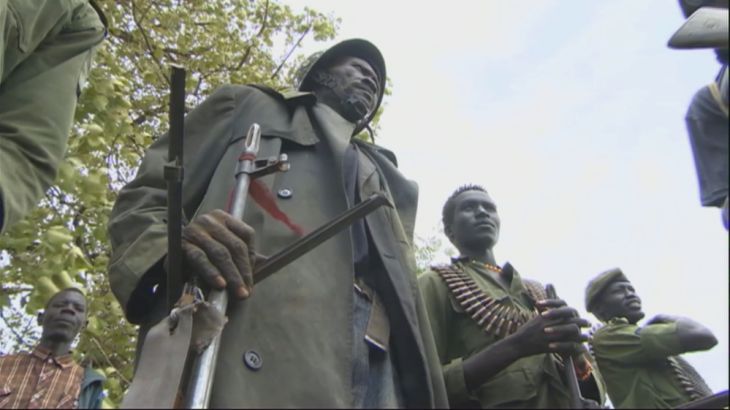There are no clear winners in South Sudan’s war
With about 3.5 million uprooted from their homes, children are the biggest losers in South Sudan’s war.

Kajo Keji Country, South Sudan – With their faces and clothes caked in dust after a long, gruelling bus journey, we are greeted by dozens of hungry and tired-looking rebels at a camp near the South Sudan-Uganda border.
Carrying AK-47 assault rifles, machetes, grenade launchers and even bows and arrows, the rebels, who have been brought in as reinforcements, have no time to rest and quickly prepare for the front lines.
|
|
Their commanders are uncomfortable that government troops are only 15km away.
The rebels belong to the Sudan People’s Liberation Movement-in-Opposition (SPLM-IO) group, the country’s main rebel group, who are fighting against government soldiers, also known as the Sudan People’s Liberation Army (SPLA).
The SPLA is historically a liberating force that formed in the 1980s to fight the government of Sudan. It helped the South gain independence in 2011 but a civil war broke out soon after, in 2013. The conflict was triggered when President Salva Kiir, a Dinka by ethnicity, accused his then Vice President Riek Machar, a Nuer, of plotting a coup against his government.
A peace deal between the two sides was finally reached in early 2016 and Machar reinstated as vice-president. That did not last. On the eve of independence celebrations in July, renewed fighting between troops loyal to the two clashed in the capital Juba setting off another wave of violence that has displaced millions of South Sudanese.
READ MORE: Children bearing the brunt of South Sudan refugee crisis
That is how Kajo Keji, a county of more than 200,000 people, according to a 2008 census, got caught up in the fighting.
More than 100,000 people have fled from that area to neighbouring Uganda. Others, however, are staying at camps for displaced people in South Sudan close to the border.
It’s at one of these camps that we meet Jennifer Pitta. She was making bean stew for nine children.
When the food is ready – she serves them a small portion. I know for sure it’s hardly enough for all of them but she says the children have to eat what they get.
She told us her oldest son was killed in January by men dressed in military uniforms. She was not able to bury him because she had to take his children and run.
“That’s what saddens me the most and the fact that he used to help me get food and now I have to do it all by myself.”
IN PICTURES: Nowhere to run for the children of South Sudan
On the day we visited, rebel commanders and administrative leaders who took control of the area in December were meeting the community. They were received with songs and chants of “Viva SPLM-IO”.
I asked Jennifer, who was not part of the fanfare, who she supports – government or rebels? Her answer was one I’ve come to frequently hear from many South Sudanese.
|
|
“The problem is you box us into taking sides. It’s either ‘I support the government or the rebels’. If government soldiers come here now, they would kill us because they think we’re rebels. Same thing will happen if rebels take territories the government controls. We don’t get to choose who comes to our areas to take over our lives. We just have to co-exist with them and hope they live with us in peace.”
The rebel leaders we spoke to say they are fighting for the rights of ordinary citizens such as Jennifer. They believe that the president and his administration have alienated other tribes of South Sudan in favour of the Dinka, who they say control the state.
But there are seemingly no winners in this war. The president and his government are sitting uncomfortably in Juba – ruling a deeply divided nation, dealing with increased violence, a devastating famine, a crumbling economy and an international community that is getting fed up with what looks like a failing state.
The SPLM-IO is not fairing much better. The movement is facing internal struggles leading to defections. It’s armed wing is reportedly running out of weapons and ammunition and members of the movement are becoming increasingly disillusioned in the absence of their leader Riek Machar who is in exile in South Africa.
READ MORE: South Sudan – ‘There are only dead bodies’
We leave the rebel fighters in an upbeat mood. They were preparing to feast, drink, then head off to the trenches. They tell us that their morale is high and victory is coming.
A week after our visit – I receive a call from one of the administrative leaders, Governor Frank Matata. Government troops have advanced and have tried to take the barracks where we were.
If that happens, it could mean bad news for civilians living in the area. They may be forced to seek refuge in Uganda after holding on for so long to a country they don’t want to leave.
About 3.5 million South Sudanese have been uprooted from their homes. Families of thousands who have died are still grieving and looking for answers. Many people are starving because they cannot go to their farms. Children are not going to school.
Those are the biggest losers in South Sudan’s war – and that’s a sad reality.